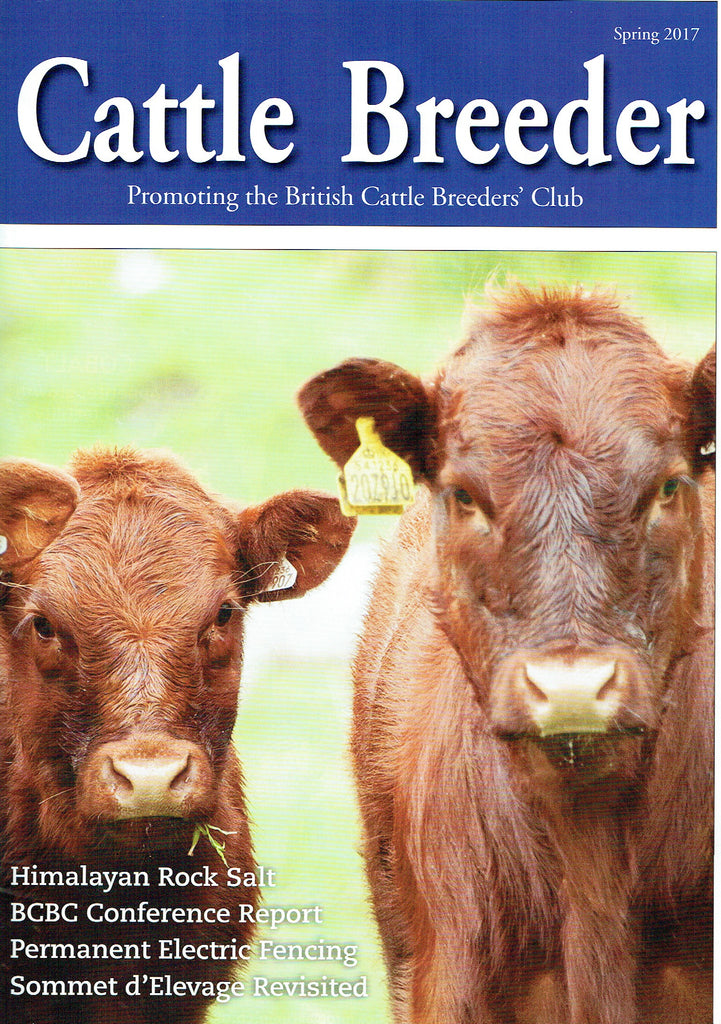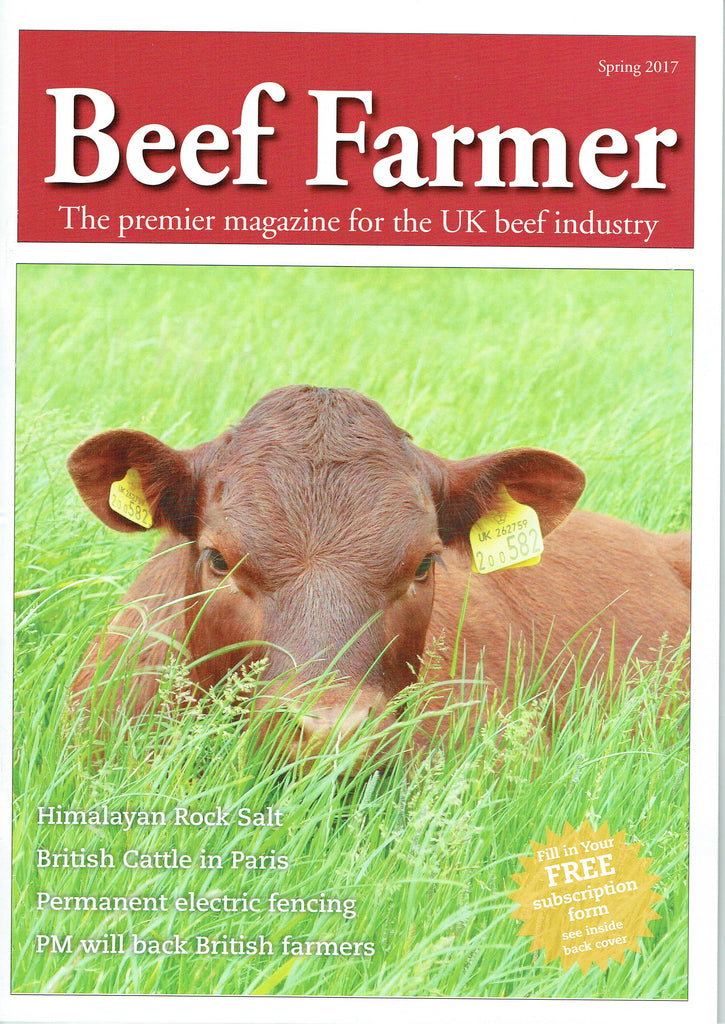News
And exactly what does a clean calving pen look like?
And exactly what does a clean calving pen look like?
During and since completing my Nuffield study entitled “Alternatives to Antibiotics in Agriculture”, I identified that husbandry practices on livestock farms, ruminant and monogastric, increase stress and infective bacterial challenge on livestock without farmers realising so. I found that farmers, when they can see and understand a problem, are very good at fixing those issues. They are not so good when it comes to problems they can’t see or understand. Farmers don’t see dead animals as a result of antibiotic resistance; they see dead or sick animals due to, for example, E.coli infections.
In my attempt to understand the effect of Anti-Microbial Resistance (AMR) within agriculture, I struggled to understand:
- Why broiler chicken farmers in Australia, America and Canada got equal or better feed conversion ratio’s and less mortality than we do in the United Kingdom (UK), even though they only clean and disinfect their sheds once a year, whilst we clean and disinfect after every crop, every 39 to 43 days? They would place a new crop of chicks onto the previous crops’ dirty litter. We would place new chicks in clean disinfected freshly littered sheds.
- Why pigs farrowing in old, at first sight dirty, farrowing buildings had healthy piglets, whilst brand new setups where piglets are born into almost sterile conditions had mortality rates of up to 25%?
- Why dairy cows are susceptible to mastitis infections whilst beef cows aren’t?
- Why lambs born inside, in clean and disinfected sheds get infections and scour whilst lambs born outside in muddy fields don’t?
- Why calves born in nice warm disinfected sheds with clean bedding get bacterial infections that cause scour whilst those that calve outside in the rain, wind and on muddy grass don’t.
By studying both diagnostic tools for agricultural use and types of bacterial infections of livestock, I realised that AMR in agriculture is as much of an issue in terms of Biocides as Antibiotics. In other words, bacteria have developed strategies to cope with disinfectant use on farm to as well as antibiotic use. As farmers we seem to be unaware of this scenario.

Animals don’t live in sterile conditions; neither should we keep them in conditions conducive to bacterial infections. There is an assumption within agriculture that when we use disinfectants, we reduce the bacterial challenge our animals face. But, this is an assumption that is NOT based on evidence. My Nuffield study led me to the conclusion that if we are to develop strategies on farm that allow for prudent use of antibiotics, then we have to generate evidence of what bugs are actually causing the infective issues we are trying to resolve. Not all bacteria that cause infections in our animals can be treated with antibiotics. I was amazed to find that of the fifteen common mastitis causing micro-organisms’ in dairy cows, only four can be treated effectively by antibiotics. When our dairy farmers detect clinical mastitis, the first call to action is often to treat the animal with an antibiotic. If the bacteria causing the infection can’t be destroyed by the said antibiotic anyway, the farmer is wasting time and money and increases the risk of AMR by treating.
The assumption that surfaces are clean post disinfection needs challenging. What I have found, based on evidence generated on farm, is that, post disinfection; concentrations of disease causing bacterial colonies have intensified and proliferated on the surfaces that come into contact with our livestock and farmers / farm workers. So, for example, piglets in disinfected farrowing buildings are being born onto surfaces where there are concentrations of disease causing bacteria three days before the immunoglobulins in the sows colostrum can build an antibody mediated immune defence within the piglet to fight bacterial infections. This happens either because bacterial colonies present on the surfaces have become resistant to the disinfectant, or, due to biofilms protecting these bacteria from the disinfectant. New born calves, lambs, chicks, even smolt fish all face the same fate when surfaces become dominated by disease causing bacteria. The need for antibiotic treatment is fuelled by the disease causing bacterial infections that take hold prior to the formation of the animals antibody mediated immune defence.
By using on farm diagnostic tools, farmers are able to develop strategies based on them being able to visualise the root cause of their infection problems. They can see which bacteria are infecting their animals. They can decide, quickly, based on veterinary protocol, if they should treat the animal with an antibiotic or not based on evidence. They can make an informed decision, based on evidence, as to the efficacy of their hygiene protocols in reducing the bacterial loading and hence stress on their animals. Farmers however don’t tend to be microbiologists. They need simple tools to enable them to generate the information they need to limit bacterial infection stress on their animals.
Note:
Image1.
Piglets born onto slats with a high concentration of infective bacteria
Image 2.
Cow close to calving. High concentrations of infective bacteria found in bedding sand.
By Aled Rhys Davies
Colostrum - Is it under valued?
Knowing which cows have beaten the bugs on our farms is "half the battle". Their colostrum is "Gold Dust" in building the next generations' immunity. Using Pruex Dry Off Plates, we can find out which quarter has a bacterial infection and build a colostrum strategy from there.
Managing colostrum can be tricky. Colostrostart is an excellent freeze and thaw system that makes the whole process easier.
Calving and weaning, how can we help?
During my travels as a Nuffield Scholar, I visited three continents researching my topic, “Alternatives to Antibiotics in Agriculture”. I looked at aquaculture, (Fish Farming), Laying hens, Broiler chickens, Pig production, Dairy, Beef and Lamb production in an attempt to find good practice and to see if one sector had transferable skills that could benefit another in terms of limiting the need for antibiotics.
Regardless of country, farming method adopted, either high or low input, determination of farmer to succeed, or age of farmer, there was a consistent theme that flowed through my investigations. The healthier an animal was in its early life, the more production would follow. In other words, sick young stock had inhibited production capabilities for the rest of their lives.
I’d always wanted to travel to Tasmania, I don’t know why, a century earlier; I’d have wanted to avoid the place at all costs. What a beautiful place though. A mixture of native bush, magical coastline, emerald green grazing and bright blue sky, made this island feel special. The warnings of icy roads at every hair pinned corner, and there were a few, made me realize how close to the South Pole I actually was. My destination was a large salmon Hatchery owned by Huon Salmon. Upon leaving the tarmac road, I followed a dirt track for around ten miles and then I saw it, a purpose built fish hatchery nestling in the valley that lay ahead, a mixture of enormous buildings and silos, surrounded by fresh water lakes. I’d prepared myself for scale, but this place looked from a distance to be the same size as Aberystwyth. What a place! I got a great welcome, took photos, asked questions and marveled at what I saw.

The following morning, I was in the Capital City of Hobart, on the top floor of the tallest skyscraper on the island, aware of the depth and quality of the carpet under my feet, and very grateful for the early morning, top quality coffee on offer. I was meeting Huon Salmons’ veterinary team. Based on my tour of their hatchery I had a long list of questions prepared for them. The answers I got were simple and really focused my mind. The stronger and more disease free they could keep their fish at hatchery, the better they would perform once in the finishing stages in the sea cages where they are fattened for market.

I got a similar answer when studying pig and poultry. Management of youngstock that reduces stress from disease was often the difference between profit or less profit. In these sectors, the attention to detail in the animals early life was vital to crop viability.

I compared this to the ruminant sectors, an area I knew more about. It seemed to me that we accept that lambs and calves get scour within a fortnight of birth, and that there is a dip in production at or around weaning.

In Alberta, Canada, the issue of youngstock disease became apparent as an issue for beef farmers. One of the feed lots I visited supplied McDonalds, and reared 35,000 head of beef annually. They had 28,000 cattle on site at any one time. The owner quoted his biggest issue as being sourcing new cattle. If he could get a regular supply from suckler cow units he was happy. He didn’t want beef from the dairy herd as the stress those calves endured in their early life determined their production within his feed lot. He didn’t want low performers. He needed uniform production, he didn’t want runts at any cost.

He needed a great deal of feed and somewhere to put it. It was easy to spot his grain store.

What I learned from looking at the issue of youngstock health during my Nuffield travels is that we must not assume that our calves are going to be ill around a fortnight post calving. Calving pen hygiene is paramount. If our calves are born onto surfaces that are infected by disease causing bacteria three days before their immune system is built, then yes, they will likley scour. Ask yourself the question, Are my calves healthy in the first week of their lives? If the answer is yes, then good. If the answer is no, then rather than keeping on administring antibiotics to your sick calves, you need to change something. Start by analysing the cleanlines of where the calf was born.
Weaning can aso knock a calfs production. In Canada I became aware of a very simple system that enabled a two stage weaning. Calves at weaning were found to become stressed at loosing both access to milk and their mothers. To prevent this stress, a simple plastic nose tag is fitted to a calf’s nose at weaning. It prevents the calf getting milk, but it still has the comfort of being with it’s mother. A weak later, the calves can be weaned from their mothers with little stress. The company that produce the QuietWean tags report that:
- Producers have found that QuietWean nose tags reduce “shipping fever” and respiratory infections
- Less need for antibiotics
- Calves weaned using QuietWean spend 25% more time eating, 95% less time bawling and pace up to 15 miles less than traditional weaning!
- QuietWean tags can be used again and again, making them very economical
Successful, low-stress weaning can be accomplished in only 4 – 7 days
It appears to me that with focus on what we do every day we can improve productivity in our beef production by limiting stress on our youngstock. In the past we’ve been ready to apply an antibiotic to fix our problems. It’s time we address our focus.
My Nuffield experience allowed me to understand the value of focus.

One of our cockerels at home decided that I was a threat when I attempted to feed him and his hens as a boy. From the time of his attack to my Nuffield travels, I had a phobia of all things feathered. No, more!
The Nuffield Farming Scholarship Trust rewards individuals in agriculture and rural industries with opportunities to travel, broaden horizons and advance industry knowledge. For more information try www.nuffieldscholar.org
Beware - Anti Microbial Resistance is here!
Antibiotic resistance is a problem created in the main by human misuse of antibiotics. It's being dressed up as an issue born from agriculture. Whilst agriculture is not blameless, it is not the main cause of the problem. We humans are to blame. As consumers we need to take responsibility for our actions. We have insisted that doctors give us antibiotics for a sore throat without knowing if the route cause is indeed bacterial or viral. We have started taking a course of antibiotics when we have been ill, but once we felt better, neglected to finish the course. We have demanded cheap food, and have forgot to reward good farmers for producing clean food.
If you need to know more about Anti Microbial Resistance, read this article.
If you want to do something about the situation, we need to talk.
Aled Rhys Davies
A Welsh Drover back in London
From around the time of the Norman Conquest to the end of the 19th century, any traveller in Carmarthenshire in West Wales would have witnessed large droves of cattle, horses, sheep, pigs and geese, stretching over half a mile long being driven to the East of England for sale at livestock fairs, the cattle for further fattening before their ultimate sale in London markets. A horseman and two cattle acted as leaders for the drove. Each large drove of cattle would have comprised of several smaller droves from the villages of West Wales. It is estimated that for every four hundred beasts there would have been around twelve men, or drovers as they were referred to, all of which would have called and bellowed all the way to London. This must have been some spectacle to behold, as people spoke of the noise that was generated for generations after the practice of Droving gave way to the power of steam and the train network. The noise generated had two objectives, firstly to move the drove along, and secondly to warn the farmers in the locality of the impending threat. They of course would scramble to move their own livestock from the route as once mixed into the drove, they would be difficult to separate.
During these times, Welsh farmers derived most of their income from the breeding of black cattle. The Drovers not only provided a marketing service for their livestock, but were the main source of news for rural communities as to what was happening in London and further afield. The so called easy life in the new lands of America would have typically permeated the Drover grape vine.
By the 19th century, the Drovers were professional men that needed licences to operate. To get such a licence, a Drover had to be over thirty years old, married and a house owner. No hired staff were eligible to run a drove. In 1799, Dafydd Jones founded the Black Ox Bank in Llandovery to facilitate the growing demand for the services of the Drovers. The bank had its own notes which carried the emblem of a Black Ox, examples of which can still be seen in the Llandovery heritage centre. During this time, Government agents had quite a headache negotiating highwaymen, thieves and pirates in safely navigating ship money and rents from West Wales to London. The answer came in the form of the Drovers Banking system. The Government agents would deposit monies in banks such as the Black Ox Bank. That money was used to purchase cattle, sheep, pigs, geese and by that time even turkeys for droving to London. The money raised from the sale of the stock that had matured and grown throughout the journey to London was used to pay debts and deposited in London banks. The safe passage of rent and ship money was secured in the form of livestock. No Highwayman was a match to the drove. The Black Ox bank prospered and was purchased by Lloyds bank in 1909.
Press cuttings from the period make very interesting reading and give an insight into the spectacle that must have embodied the process of Droving.
Daily News, September 1850. Beyond the Welsh Horse fair and nearer to Barnet is the Welsh cattle fair. Here all kinds of Welsh cattle are to be met with. These cattle are generally black, and though small are kindly and well-shaped animals which prove profitable where there is rough land attached to a farm on which they can run through the winter and until they improve their condition on a moderate quantity of food. They are much bought by the farmers of Hertfordshire, Essex, Sussex, Kent and Middlesex.
Barnet Fair, Farmers magazine 1856. Imagine hundreds of bullocks like an immense forest of horns propelled hurriedly towards you amid the hideous and amorous shouting of a set of semi-barbaric drovers who value the restive bullock far beyond the life of a human being, driving their mad and noisy herds over every person they meet if not fortunate enough to get out of their way, closely followed by a drove of unbroken wild Welsh ponies fresh from their native hills all of them loose and unrestrained as the oxen that proceed them, kicking, rearing, biting each other amid the unintelligible phrases of their human attendants – lots of non-English speaking Welshmen.
Those Welshmen needed to be highly skilled stockmen. The value of their drove would either increase or decrease on route to the London markets according to their ability and ingenuity. Not only was the threat of storm or drought a concern, but also disease such as foot and mouth. The negotiation of the drove no doubt carried risk and took dedication. There were also human perils to be aware of.
Daily News, 1850. A Welsh Drover fell among the thieves at Barnet Fair and was considerably fleeced. He however had his revenge in the following fashion; quitting the town with his drove, he aspired one of his plunderers in the road, with the assistance of a brother drover or two he made capture of him, fastened him metsopella-like astride one of the wildest of his unbroken colts, that is, lying on his stomach with his face near the tail, started the animal off at a rough trot and after a ride of four to five miles, the fellow galled, jaded and three parts dead was glad to purchase his release from further torment by disgorging his ill-gotten pelt.
The memory of the Drovers lives long in West Wales. Many roads, pubs and bridleways are named after them. The Heritage Centre in Llandovery is well worth a visit to learn more about these honest men.
Llandovery Rugby Club players are known as the Drovers. I played for them and am proud to be a member of the “Hen Borthmyn” or Old Drovers, the ex-players organisation.
It certainly feels surreal driving sheep across London Bridge,
 as though I have completed a circle, and fulfilled in part the objectives of my ancestors. I don’t have the licence needed during those times to be a Drover and am driving these sheep on a Sunday. If I did so in Victorian times, I would be fined £5 and receive a custodial sentence.
as though I have completed a circle, and fulfilled in part the objectives of my ancestors. I don’t have the licence needed during those times to be a Drover and am driving these sheep on a Sunday. If I did so in Victorian times, I would be fined £5 and receive a custodial sentence.
The Drovers must have looked like mountain men with mountain manners to the inhabitants of the city. Beware the people of London, A Welsh Drover is back in town.
Are we too clean?
Bacteria surrounds us, we have evolved in conjunction with bacteria, around fifty percent of our body is made up of bacterial cells, with the remaining being human cells. In short, we can't live without bacteria.
Friendly bacteria can keep us healthy, and disease causing bacteria can kill us. Our use of disinfectants over the last fifty years has been with the aim of sterilising surfaces to prevent infectious bacteria from harming us.
In many retail outlets, the prevalence and availability of alcohol hand gels are on the increase. But sterilising our hands leaves a wonderful surface area for repopulation by the next bacteria to arrive on our hands. So, the very next thing we touch, our nose, our phone, or a keyboard will populate our sterile hands with the dominant bacteria that populate those surfaces. So, we run the risk of growing dangerous bad bacteria to dominate the surface of our hands. The total opposite to our aim of sterilising.
Pruex distribute Bi-safe Hand Gel, an alcohol hand gel that also includes bacteria. Once the alcohol dissipates post application, the bacterial spores held within the gel start hatching friendly bacteria on the surface of the hands. This bacteria quickly becomes the dominant population on the users hands, and can prevent harmful bacteria from colonising the surface of the skin. The process uses competition for space and resources to limit the ability of harmful bacteria to populate the hands and become the dominant bacterial population.

We teach our children to wash their hands before eating a meal or after a visit to the bathroom. We, usually in public toilets, wash our hands and are then faced with a door handle for an inward opening door. It doesn't take a genius to work out which type of bacteria populate our hands thereafter.

Bi-safe Hand Gel could keep you and your family safe.
Aled Davies - Autogenous vaccines item on the BBC
Autogenous vaccines (formerly known as autovaccines) are therapeutic vaccines, individually tailored for a patient or animal. These vaccines are made from cultures of pathogenic micro-organisms which are isolated from the site of an infection (furuncle, boils, abscess, urine).
On the 18th January, 2017, the article that featured Aled Davies, interviewed by the BBC One Show about alternatives to antibiotics in agriculture was aired. The week before, and a fortnight before, Aled had received emails, both on a Thursday stating that the feature would go out on the programme that evening. He diligently proclaimed the impending airing via social media, but the item was pulled on both occasions. He claims the "no-show" on two occasions made him very nervous. "Being filmed for an item on national television, you are at the mercy of the editor. I just wanted what I said to be properly represented, with useful soundbites making the feature as opposed to being deposited to the edit floor. When the item finally went out, I did feel a relief. Autogenous vaccines are a great tool in the prevention of disease, but my point about finding and negating the source of infection did come through."
Pruex works with farmers to find such pathogenic bacterial infections and negate their ability to infect farm animals and staff.
View the article here on the BBC iPlayer. (It starts 32 minutes in to the programme.)
Prevention or Cure?

In a modern agricultural context both animal welfare and production gains can be achieved by developing strategies to limit the effect of bacterial infections on farm. The starting point has to be based on evidence. Only by knowing which bacteria cause infections can farmers start to break the cycle of infection, cure and re-infection.
The alternative is to invest in treating every animal with a medicinal treatment, be that a bacterial vaccine, or antibiotic. Both of these treatments are given post an infection. Preventing the ability of bacteria to infect an animal is a key and achievable aim.
Pruex work with farmers to do three things:
1 Find evidence as to which bacteria are causing problems on farm
2 Based on the evidence generated, develop cleaning strategies to prevent infectious bacteria from building colonies
3 Inform consumers of good work done on farm to limit the risk of anti-microbial resistance from over use of antibiotics.
Farmers looking to develop strategies to ensure Prudent as opposed to Excessive antibiotic use should contact Pruex for more information.
Nuffield UK Winter Conference presentation
Aled Rhys Davies gave a presentation on "Alternatives to Antibiotics in Agriculture" at the Nuffield UK winter conference. View it below:
The Dairy Farmer publish an article on Pruex.
The December issue of The Dairy Farmer features Pruex. A link to the online version will be posted once it becomes available.








